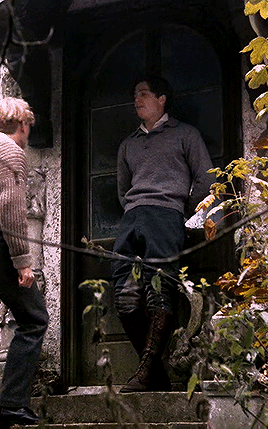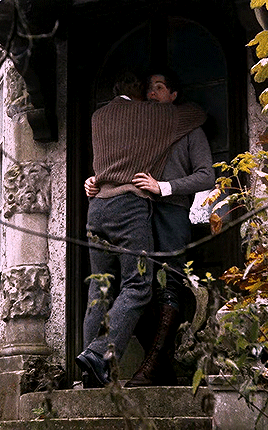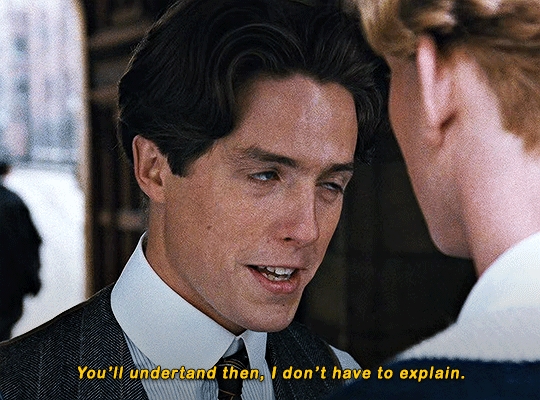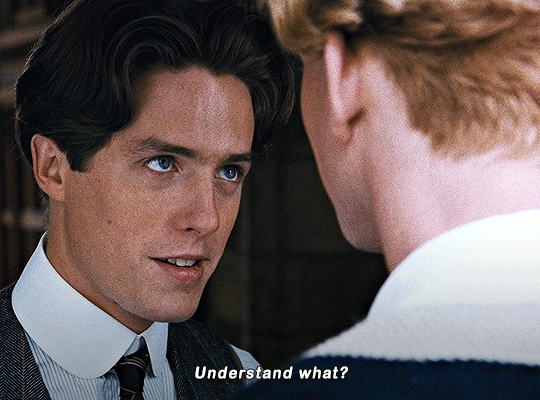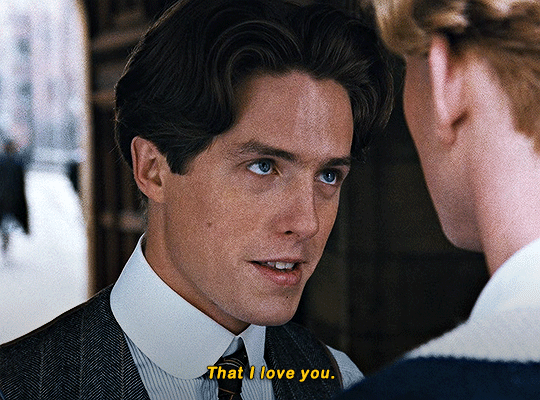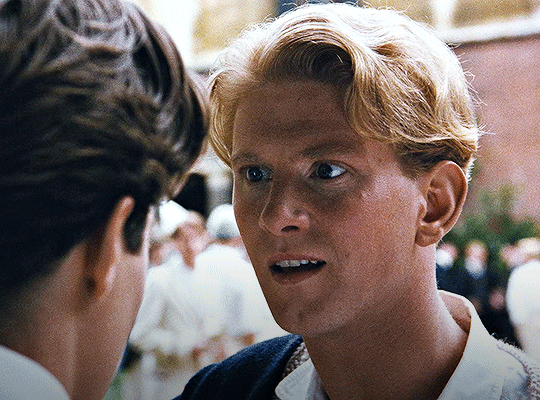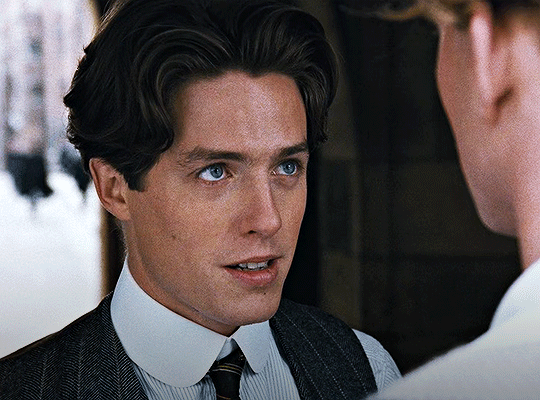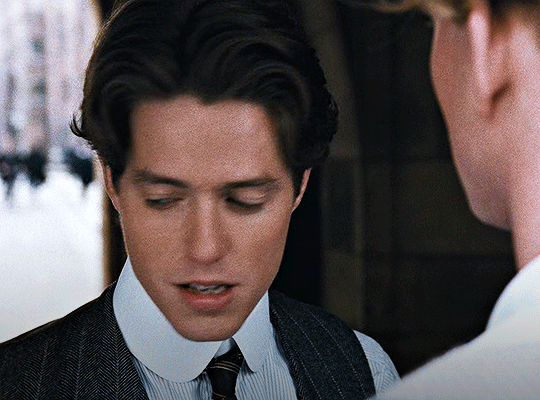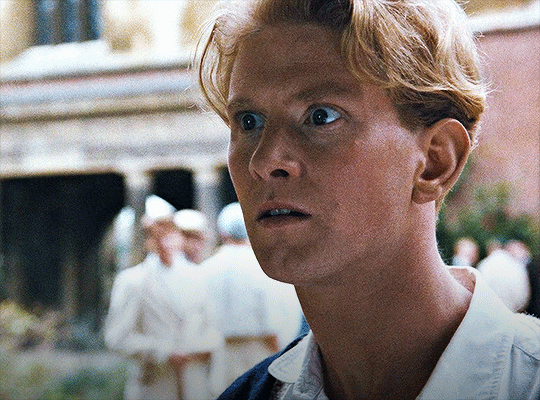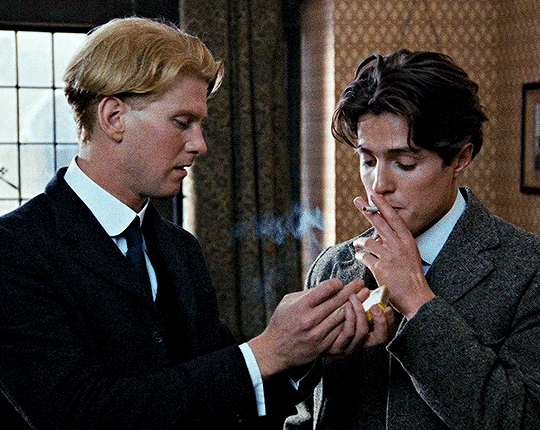Yapping about the music/leitmotifs in Maurice by E.M. Forster
Don't wanna be here? Send us removal request.
Text
Gay music major explodes in library after reading about Tchaikovsky’s blended tone of delicate flowing strings and selective woodwind instruments. (slowly losing my mind as I dissect Tchaikovsky’s influence in the film score of Maurice.)
6 notes
·
View notes
Text

Hugh Grant & Rupert Graves (c.1987) in a publicity shot for the movie Maurice.
4K notes
·
View notes
Text
Another hint to his conversion can be seen in the evening before he goes to Greece. He is much irritated by Maurice. It is obvious that Maurice’s slowness, his compassion, his never failing care for him disgusts him. He shows the symptoms of a disillusioned lover who now sees the shortcomings of his partner as if under a magnifying glass, and thus he cannot be kind anymore. “He would make slightly malicious remarks, and use his intimate knowledge to wound.”[46] Again, there is a deleted scene in the film in which this disillusionment is acted out by Hugh Grant in a superb way. The night before leaving for Greece Clive reveals his torturing thoughts. He is considering the fact that if there is Hell he and Maurice might end up there instead of lying peacefully in their graves. But as always, Maurice is not able to follow his reasoning so Clive starts to mock him. “Well then, what did you care about in me?...Let’s hear!... Is it my beauty?... These somewhat faded charms. Hair’s falling out, are you aware?” But this mocking sounds more like self irony as he knows that his old self is getting thinner and thinner. The reason why Ivory let this scene be cut from the final version of the film is that the inserted part with Lord Risley’s scandal provides ample motivation for Clive to change his mind, as we will see later on.
Source
36 notes
·
View notes
Text

English actor James Wilby in his leading role as Maurice Hall is photographed with director James Ivory, producer Ismael Merchant and actor Hugh Grant on location filming ‘Maurice’, November 1986.
590 notes
·
View notes
Text
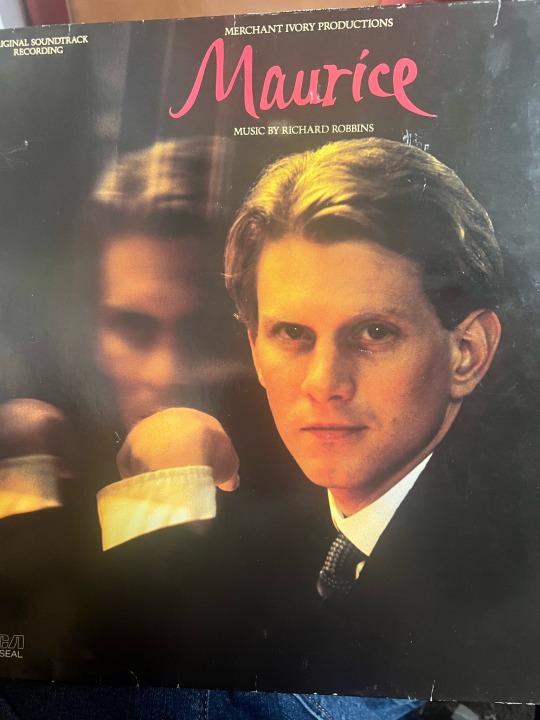
You ever just casually own the soundtrack to the movie that changed your life? Yeah me neither.
86 notes
·
View notes
Text
I’m finishing up my first read of Maurice and I realized that Maurice and Alec had somewhat of a museum date. Sure, they were both on interesting terms, but I think a date is a wonderful way to look at them meeting at the museum.
24 notes
·
View notes
Text
Thank you sm for this extra information!! I will definitely check out the documentary!!
Recurring Musical Motif
One thing I absolutely adore with the Maurice 1987 soundtrack is the recurring melody that plays at different points of the movie. In the song, "Prologue: The Lesson", there is that original introduction of what I consider Maurice's musical motif/theme. The way I see it, the motif plays when Maurice is feeling fulfilled and loved, or when he feels like himself. He was given presents by his classmates and teachers, henceforth feeling fulfilled and loved. This motif does not play again fully until later in the movie because even though Maurice loved and was loved by Clive, he was not feeling fulfilled, at least not in the scenes we see.
Sometimes small amounts of Maurice's motif will show up in the music. For examples, that similar motif plays during his nightmare, "A Moonlit Night."
However, the full portion of his motif doesn't play until "The Boathouse." This is when he is reunited with Alec after he thought he would never see him again. That familiar motif then slowly creeps it's way in, connecting the music back to the idea of Maurice feeling fulfilled. When the end credits start to roll the fully fleshed out version of Maurice's motif/theme starts to play.
To me, the music is the way it is because Maurice is finally feeling fulfilled and happy. He's feeling like himself. Maurice found someone who will love him without fear and would sacrifice so much just for him. It is a wonderful ending to the bittersweet story in which the music gives us a big finish at the end.
Even if it was not intentional, the musical storytelling that occurs is one of my favorites. The music helps paint a picture and it was perfect in Maurice 1987.
52 notes
·
View notes
Text

James Wilby does not have a flamboyant appearance, but he is an actor with exceptional talent in conveying emotions through facial expressions and smooth lines. Even though he has a different impression with the original book by Forster, he portrayed Maurice Hall so perfectly that it is challenging to envision an actor who could replace him in this role. When he is emotionally sharp, his blue eyes feel cold; however, when he talks about love to his lover, he expresses beautiful and genuine emotions akin to a deep lake. Even when he turns his back, the narratives told by his body language deeply immerse him in the character of Maurice Hall. In this movie, primarily portrayed from the first person perspective of Maurice Hall, I would like to talk his back amidst the numerous images captured by the camera.


When he portrays a foolish, immature appearance, his shiny blonde hair harmonizes with his back, effortlessly conveying the apperance of shrugging his shoulders. In doing so, we can feel his youthful. On the other hand, when he broke up with Clive and he was alone in a dark room smoking a cigarette and writing, he felt overwhelmed by loneliness and sadness. He seemed withered, his broad back appearing small and shabby, and even his intense trembles were noticeable. Even though we couldn't see his face or interpret his expressions, James Wilby possessed a unique ability to convey emotions to the audience solely through his body movements. He truly embodied the character of Maurice Hall and proved himself to be an exceptional actor.


When he goes to his lover, the excitement and feeling of love are experienced more intensely and passionately than ever before. In particular, in the scene heading to the boathouse, the scene depicted the boathouse, a place he had never visited before, as larger than Maurice. The small and shabby place that had seemed like an isolated island in the previous scene now turned to big and significant to Maurice. It is seen as a meaningful and large place. Maurice runs through the forest, exhaling wildly and displaying full excitement on his face. Simultaneously, in the following scene, his back continues to reflect these emotions, effectively conveying his excitement to the audience. And before opening the door to his destination, without even a telegram, we stand alongside Maurice, feeling the fears and worries he confides from behind his face as he faces the door to his destiny.
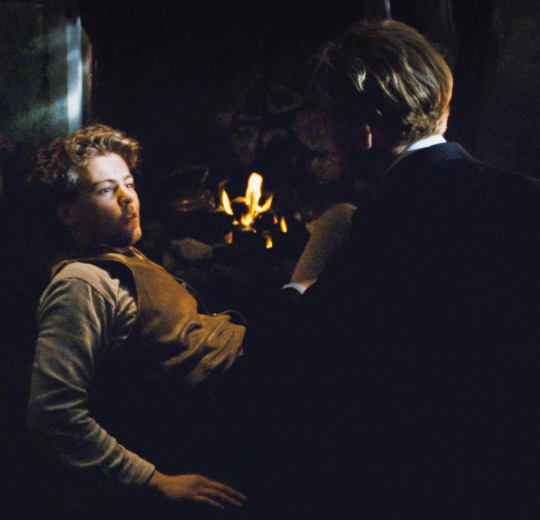

We are unable to see the expression on Maurice's face as he spots Alec at the boathouse, approaches him, and promptly collapses to his knees, releasing a torrent of emotions. Instead, the camera chooses to illuminate Alec's grinning face with the bright moonlight. Actually, I tried to look at Maurice's face several times, but it felt meaningless since I already knew what he must be feeling. In the scene leading up to the movie's climax, emotions reach their peak as Maurice's face, filled with love, is only visible to his lover. Positioned in a dimly lit spot, Maurice's back is turned, Alec illuminating him. Confirming each other's love and sincerity, Maurice and Alec shared kiss, a scene filled with promise of eternity. In that moment, Maurice was liberated from the wounds of the past, free from loneliness and sadness. His back felt wider than ever, with strength that could firmly embrace Alec. I still believe that the director who made this choice were correct, and I think the angle was excellent.


In fact, my favorite scene, which also marks the beginning of this post, was when Alec wished Maurice a happy birthday. When he turned around and also the indifferent gaze he directed at the suddenly approaching gamekeeper both made the audience feel his profound sense of hurt and loneliness. In addition, I liked this scene the most because it effectively conveyed Alec's love for Maurice. Alec's sadness of having to continuously look only at the back of the person he loves overwhelms him, not just in this moment, but since the day he ignored the five shillings. The emotions he must have felt every time he saw the back of Maurice, someone so precious to him, So he couldn't help but sneak a gaze because facing Maurice's face directly was not easy for him. In response to his first sincere words, Alec was finally able to make eye contact with him, albeit only briefly. The emotional connection persisted even when he didn't reveal his face. The reason of the fact that did not reveal Maurice's expression to the audience at the last boathouse, Perhaps because it was the priceless moment meant exclusively for Alec, who always had to view Maurice's back.
Maurice's angle, which repeats light and darkness and conveys the narrative sometimes through the figure's back, possesses a softness and delicacy. I really liked Maurice's back. Even for someone like me, who finds it hard to easily fall in love, his presence made my heart race so intensely that I was emotionally overwhelmed, just like Alec. At times, I also experienced feelings of sadness and loneliness, just like Maurice himself. Maurice was that kind of movie for me.
115 notes
·
View notes
Text
Recurring Musical Motif
One thing I absolutely adore with the Maurice 1987 soundtrack is the recurring melody that plays at different points of the movie. In the song, "Prologue: The Lesson", there is that original introduction of what I consider Maurice's musical motif/theme. The way I see it, the motif plays when Maurice is feeling fulfilled and loved, or when he feels like himself. He was given presents by his classmates and teachers, henceforth feeling fulfilled and loved. This motif does not play again fully until later in the movie because even though Maurice loved and was loved by Clive, he was not feeling fulfilled, at least not in the scenes we see.
Sometimes small amounts of Maurice's motif will show up in the music. For examples, that similar motif plays during his nightmare, "A Moonlit Night."
However, the full portion of his motif doesn't play until "The Boathouse." This is when he is reunited with Alec after he thought he would never see him again. That familiar motif then slowly creeps it's way in, connecting the music back to the idea of Maurice feeling fulfilled. When the end credits start to roll the fully fleshed out version of Maurice's motif/theme starts to play.
To me, the music is the way it is because Maurice is finally feeling fulfilled and happy. He's feeling like himself. Maurice found someone who will love him without fear and would sacrifice so much just for him. It is a wonderful ending to the bittersweet story in which the music gives us a big finish at the end.
Even if it was not intentional, the musical storytelling that occurs is one of my favorites. The music helps paint a picture and it was perfect in Maurice 1987.
52 notes
·
View notes




















